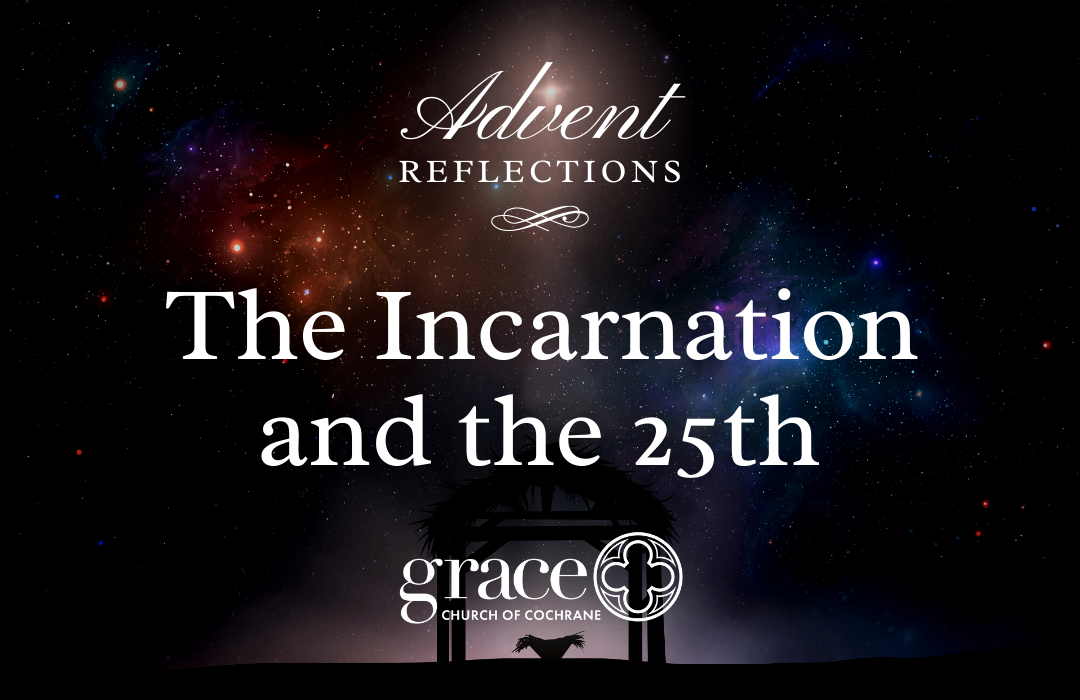The Incarnation and the 25th

Christmas Day is almost here. The culmination of all the hustle and bustle. I probably won't be the only parent feeling a little tired this weekend!
Every 25th of December, we stop and celebrate. What do we celebrate? The astounding and unbelievable mystery that defines the Christian faith: the Incarnation. God become man – the divine takes on flesh. Stop and think what an amazing thing that is! God the Son, the Second Person of the Trinity, worshiped and adored by uncounted millions of angels above, dwelling from all eternity to all endless ages in unapproachable, inexpressible light, humbles himself as he takes on humanity and all the things that set it apart from its Creator. Things like changeableness; Jesus aged, after all. Things like weakness, as he grew tired and hungry. Things like finitude: Jesus, in his humanity, grew in wisdom, and even as an adult did not know all things as he does in his divinity. Such a condescension this is. Such a humiliation.
And he did so not out of curiosity, nor out of selfishness. He did so in order to give himself as a sacrifice for others. He did so to pour himself out as an offering for our sins, to suffer the ultimate indignity on our behalf.
Without the Incarnation, we would have no Mediator between God and man, no perfect and sufficient propitiatory sacrifice for our sins. Without the Incarnation, we would bear our own burdens and have to stand before a wrathful and holy God with the full weight of our sins on our own backs alone. Without the Incarnation, we would have no hope at all, no salvation.
That’s what we celebrate the 25th of December. Only Easter stands as another so distinctively Christian an observance. And yet, the Bible says nothing, commands nothing, about Christmas observance. You’ll find no detailed instructions in the New Testament about observing Christmas like the list of procedures for the Passover or the Feast of Booths in the Old Testament. You don’t find anything at all relating to Christmas observance, not even quiet, subtle examples like that of Lord’s Day worship in the Scripture.
Simply put, Christmas is not required of the Christian. It would fall neatly under the issue treated by Paul when he said, “One person esteems one day as better than another, while another esteems all days alike. Each one should be fully convinced in his own mind” (Romans 14:5). Yet while it is not required, in light of Paul’s instructions, it is not forbidden either, and so Christians in every age have taken time each year to mark and celebrate God's stepping into space and time, for us men and for our salvation.
Most Christians in the Western tradition (Protestants and Catholics) celebrate the Incarnation on the specific day of the 25th. Many Eastern Orthodox Christians, by contrast, celebrate Christmas on January 7th. Why the 25th rather than January 7th? Or, conversely, why the 7th and not earlier, in December? Why not another day entirely? There are various reasons given in Christian history and tradition for both December 25th and January 7th, and some may well be pretty compelling. But the fact is that we simply don't know for sure that he was actually born in either December or January. On the other hand, I read an article some years ago arguing that it was likely in April or May, but we can't know that either. That stands in contrast to Easter; while the early church squabbled about that day, too, scholars actually have a pretty good idea what the dates of Jesus’ death and resurrection likely were (April 3 and 5, 33 A.D., respectively, just in case you were wondering!).
So God in his wisdom declined to reveal the exact date of the first Christmas. That’s interesting, but there are practical, devotional applications we can draw from this. First, it reminds us that the true miracle of the Incarnation happened before that night in the stable; that the true wonder isn’t the virgin birth but rather the virgin conception of Christ. So in the midst of all the focus on the birth of Christ, let’s not forget that God’s gift was really given nine months beforehand and that his gift was far more than the safe delivery of a child in a stable. The Incarnation is bigger than Christmas, going back in time as well as forward.
And second, the fact that the 25th may not really be Jesus’ actual birthday and that, for all we know for certain, his real birth date could really have been any day, can serve to remind us that our wonder and thankfulness for the Son's condescension should not be confined to just one day, however special we make it. The life and death of Christ supplies our righteousness, saves our eternal lives, and should increasingly be reflected in our daily walks. There is a real and an important sense that every day should be Christmas for us. We should constantly remember, every day, the mercy and grace shown to us by God in giving Christ to live as a man for us.
So I hope and pray you all enjoy the day, and that you all take some time to meditate on the sheer grace we have been shown by God in the Incarnation. Merry Christmas - this weekend, and year-round.
More in Blog
August 15, 2022
Registration is LIVE for our "Zoomerang" VBS August 15-19!June 14, 2022
Means of Grace for June 14: God's Nature, Spurgeon's Evangelist, Culture War, Tradition & More!March 16, 2022
Preparing for One's Baptism Service